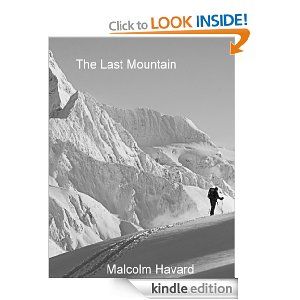The Last Mountain by Malcolm Havard: book review
 |
| The Last Mountain by Malcolm Havard |
I came across Malcolm Havard’s book by chance on Amazon,
and downloaded it on impulse. I’m an indie author of mountain fiction myself so
wanted to do my bit to support the genre.The
Last Mountain is written from the point of view of Melvyn, who can only
be described as an anti-hero. He is selfish, arrogant, lazy, and yet also
ambitious. He is a financial and emotional drain on his long-suffering partner
Fi. Despite his less admirable qualities, the story is simply riveting from the
start; the reader sees Mel’s bad decisions piling up, higher than you would
have believed possible. Conscience versus ambition is a key theme here. There
is a constant sense that Mel is going to deeply regret many of the things he
has done.The
Last Mountain is a mountaineering story set in the Himalaya. Mel and Fi
stumble across an expedition to climb an 8,000m peak, but something isn’t quite
right and things soon start going wrong. Given the tight 1st person POV,
leisurely description and evocative building of setting aren’t really this
book’s strengths, but on the other hand the environment is recreated vividly in
the characters of the sherpas. This is very much a character-driven story. Many
of the characters are unsympathetic in various ways, but this can be seen as a
reflection of Mel’s self-centred and arrogant personality. The only really
sympathetic character is Fi.At the start of the book I found myself thinking that
perhaps Mel’s bad qualities were overdone a little, that his character was too
extreme, but actually as the book progressed and Mel was put through living
hell, it balanced out. This is not a feel-good book; it’s bleak and
uncompromising, but it asks difficult questions about life and death in the mountains,
and how bad choices can escalate to disasters. The stream-of-thought POV works well and provides an intimate window into Mel’s troubled world.As a climber I noticed a couple of small errors
(‘Stannage’ instead of ‘Stanage’ and ‘Peaks’ instead of ‘Peak’, although the
jury is out on that one!) There were also a few typos that I noticed here and
there, but overall the presentation and formatting was professional.The climbing parts of the story reminded me a little of
the film Vertical Limit: personal
conflicts and frequent disasters in a Himalayan setting. However, while Vertical Limit is ridiculous and often
scoffed at by climbers, I felt The Last
Mountain stayed on just the right side of the line between believable and
unbelievable. Some of the situations may seem unrealistic at first glance, but
then again true stories of mountain disaster often contain similar scenarios.The one area where I think the story misses the mark is
the character of Pete. He came across as far too extreme. I found myself unable
to take him seriously as I was unable to empathise with his point of view. He
just didn’t seem like a real person to me. That said, his actions in the climax
of the book are open to interpretation; how much of it is real, and how much of
it is in Mel’s mind?Ultimately I think it’s all in Mel’s mind, and that’s the
greatest strength of this story: an awful, disastrous misadventure with
accumulating guilt, seen from a perspective that is completely open to
interpretation. Read the book three times and I suspect the reader will draw
three different conclusions. The ending is a shock but strangely poetic.This book perhaps isn’t destined to become a classic of
the genre, but it is written with considerable courage and skill. It’s at once
shocking and unputdownable. Just another ‘ripping yarn’ this book certainly is
not, and in a genre which has recently been accused of being formulaic, The Last Mountain breaks the mould.
Alex Roddie Newsletter
Join the newsletter to receive the latest updates in your inbox.



